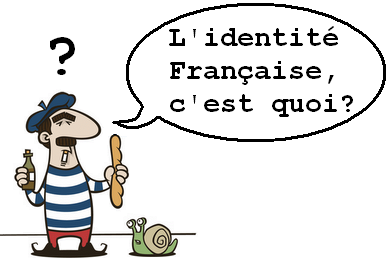
France, a country where people are made to believe in the consoling myth of equality to all citizens ‘without distinction of origin, color of skin or religion’.
It is clear that terrorist attacks in France have tailored the opinions of many people both social and political, along with reviving the notion of ‘French identity’. The phrase ‘French identity’ nowadays usually emerges following a terrorist attack in French society. It is also often discussed when explicitly referring to the banlieues (suburbs) and their residents, most of whom are people from the Maghreb region (Morocco, Algeria, Tunisia) and whose appearance, which may cause provocation amidst this social turbulence, typifies the perceivable element of their identity. When the concept of ‘French identity’ is discussed, the question of laïcité, or secularism, is convincingly touched upon; how laïcité is part of the ‘French identity’, something seen as to be conformed to when living in France. However, applying this concept to second and third generation immigrants of Northern African origins appears to have always proved challenging.
In this sense, the example of the controversy surrounding the wearing of Burkini is particularly striking. Simply note that Nicolas Sarkozy, former President of the Republic, is using this theme as part of his presidential campaign; proof that the problem is serious, alluding to and is linked to the theme of immigration, which currently serves as the source of division within the French society. While the question of ‘French identity’ covers a large and wide scope of subjects, it is worth analysing the matter with a new approach and give further thought to its association with the notion of laïcité.
In this fierce debate, the concept of laïcité is in itself threatened. It is worth noting that at its beginnings, laïcité did not have the same meaning as the current debate tends to give to it. The concept initially appeared amidst the battle against the dominance of the Roman Catholic Church, but this battle was won a long time ago. No religion today poses a serious threat to the secular domination in France, as mentioned in an article by The New York Times. The usage of laïcité now is more likely to focus on fractures and divisions, whilst it should allow the implementation of freedom and the conservation of people’s values.
There is indeed a need for neutrality in French society, but we must also respect the identity and the religions of other people, not by compelling them to get rid of what could be personally considered an, if not the, essential part of their identity. In this regard, it is worth remembering France’s colonial past- particularly the Algerian war between 1954-1962- which Benjamin Stora, a notable French historian, describes as a ‘transfer of memory’: this means that colonial memories continue to have particular resonance in contemporary French society.
Though there is a growing body of notable French writers of North African origins, such as Tahar Ben Jelloun, who managed to integrate into the French society and be successful, there are thousands of others who never did. Though this is not to be deemed as a reason for their failure to integrate or for their willingness to join fundamentalist groups, there has been an urge to blame the French government for doing little to make second and third generation Northern Africans feel French since the suburban riots in 2005. With Nicholas Sarcozy wanting to ban the veil in public entities including universities for the sake of laïcité, things are only going to become worse.
Even the notion of ‘national identity’ has been ‘shattered’, according to the French philosopher Guillaume Leblanc: the concept of a static national identity implies the idea of a nation without history or a future. This means that the concept of nation should simply be tailored to contemporary social changes because allowing in ‘exterior signs’ permits originality.
As opposed to the heavily politicised rhetoric of current French debates on ‘identity’, we may as well adopt a new approach to our comprehension of the word. Identity is, in fact, believed to represent, as the Cambridge dictionary states, ‘the qualities of a person or group that make them different from others.’ This definition clearly gives it a rather personal dimension, making reference to the characteristics that distinguish a person from others. There is also another meaning that many of us associate with the question of identity: it can indicate the culture the person has had concrete experience with, the languages they speak, whether or not they feel an affinity with a religion or a political party, for instance. In this sense, it is explicitly evident that identity involves a person’s private life and their circumstances rather than national matters that deprive the term of its original meaning, making it become political in its character.
Having taught English in France, I was never assigned the task of explaining to pupils what an ‘English identity’ was, despite England being one of the most ethnically diverse countries worldwide. So, what makes us spend, as French university students, two or three classes discussing the question of ‘identity’ and, particularly, ‘French identity’? What may lead postgraduate students to write an entire thesis on this matter ? What renders it so big of a theme ? Does a French identity exist ?
A French national identity, in fact, should not exist the way it is. Surely, a group of French people may boast many features that its individuals share in common (e.g. cultural habits or attitudes), which, eventually, would make them ‘French’. However, there should be an attempt to address the same question differently without a ‘systematic bias’ which benefits the interests of some political figures; hence Sarcozy’s current political inclination and Marine Le Pen’s political movement; not to mention the existence of Donald Trump in the US and Brexit in Great Britain.
